Commercial Off-Grid Solar Solutions
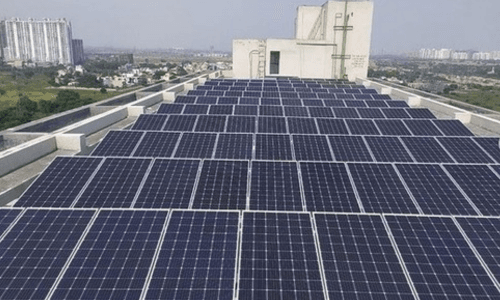
Commercial establishments such as offices, hospitals, malls, hotels, IT parks, and industrial facilities often operate in areas with unreliable grid power or require energy independence. Commercial off-grid solar solutions provide a self-sufficient, sustainable, and cost-effective way to meet these energy demands.
By generating electricity on-site and storing it in batteries, businesses can operate continuously without relying on the utility grid. These off-grid solar systems for commercial buildings are ideal for energy-intensive operations, remote locations, and facilities that cannot afford downtime.
Synergy Solar Solutiona, is a trusted commercial off-grid solar installer and supplier in India – serving Chennai, Coimbatore, Bangalore, Hyderabad, Pune, Mumbai, Delhi, and other major cities across Tamil Nadu, Karnataka, Maharashtra, and Gujarat – we provide complete standalone solar energy solutions for businesses with advanced battery backup and reliable technology.
Key Benefits for Businesses:
- Energy independence and uninterrupted power supply
- Reduction in operational electricity costs
- Enhanced environmental sustainability and CSR compliance
- Long-term financial savings and ROI
How Commercial Off-Grid Solar Systems Work
A commercial standalone solar system integrates solar panels, battery storage, and inverters to provide a reliable, independent power source:
Solar PV Panels: Capture sunlight and convert it into direct current (DC) electricity.
Inverter: Converts DC electricity into alternating current (AC) to power your building’s electrical systems.
Bi-Directional Meter: Measures the energy produced by your solar system and tracks how much electricity you send to and pull from the grid.
Grid Export: Excess energy generated by the solar panels is sent back to the grid, earning you revenue/credits through Gross Metering or Net Feed-in (as per state policy).
Grid Backup: Automatically pulls electricity from the grid when solar energy is insufficient, ensuring uninterrupted power supply.
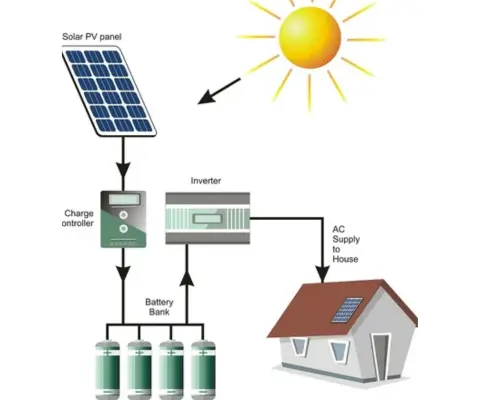
Benefits of Commercial Off-Grid Solar Solutions
Uninterrupted Power Supply
- Continuous electricity independent of grid reliability.
- Ideal for remote offices, hospitals, and data centers.
Energy Cost Savings
- Reduces or eliminates electricity bills.
- Cuts diesel generator usage and associated fuel costs.
Energy Independence
- Self-sufficient power for remote or off-grid locations.
- Minimizes operational risks due to grid instability.
Environmental Sustainability
- Reduces carbon footprint and reliance on fossil fuels.
- Supports ESG compliance and green initiatives.
Scalability & Flexibility
- Modular systems allow easy expansion for growing energy needs.
- Can integrate additional panels, batteries, or hybrid backup systems.
Key Components of Off-Grid Solar Systems for Commercial
High-Efficiency Solar Panels
- Function: Convert sunlight into direct current (DC) electricity.
- Features: Monocrystalline or polycrystalline panels engineered for high efficiency even in low-light conditions.
- Benefits: Durable, weather-resistant, and capable of delivering consistent power in urban, industrial, or remote environments.
Industrial-Grade Inverters
- Function: Convert DC electricity from solar panels and batteries into alternating current (AC) for commercial equipment.
- Features: Advanced inverters handle fluctuating loads, maintain voltage stability, and enable seamless integration with multiple battery units.
- Benefits: Ensures smooth operation of critical equipment, from IT infrastructure to hospital life-support systems.
Battery Storage System
- Battery Storage System• Function: Stores surplus energy generated during daylight for use during nighttime or low-sunlight periods.
- Features: Industrial-grade lithium-ion or lead-acid batteries with long life cycles, high efficiency, and modular design.
- Benefits: Guarantees uninterrupted power, reduces dependency on diesel generators, and ensures business continuity in remote locations.
Charge Controllers & Safety Devices
- Function: Manage the flow of electricity between solar panels, batteries, and inverters.
- Features: Overcharge protection, short-circuit prevention, and temperature management.
- Benefits: Extends battery life, protects expensive equipment, and ensures safe, reliable operations.
Monitoring & Control Systems
- Function: Provide real-time visibility into electricity generation, storage, and consumption.
- Features: Cloud-based dashboards, SCADA integration, remote access, and alert notifications for underperformance or faults.
- Benefits: Enables predictive maintenance, performance optimization, and energy management for large commercial facilities.
Mounting Structures & Cabling
- Function: Secure solar panels and electrical components in place.
- Features: Corrosion-resistant aluminum or galvanized steel frames, designed for rooftop or ground-mounted installations.
- Benefits: Ensures structural stability, proper panel orientation, and long-term system durability.
Applications of Off-Grid Solar Systems for Commercial Use
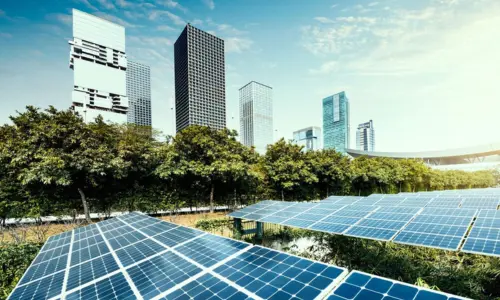
Office Complexes & IT Parks
Ensures continuous power for lighting, HVAC, and IT infrastructure.
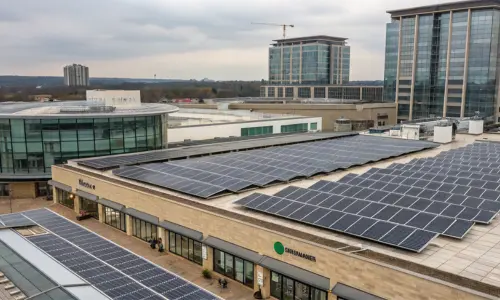
Shopping Malls & Retail Chains
Powers lighting, air conditioning, and security systems sustainably.
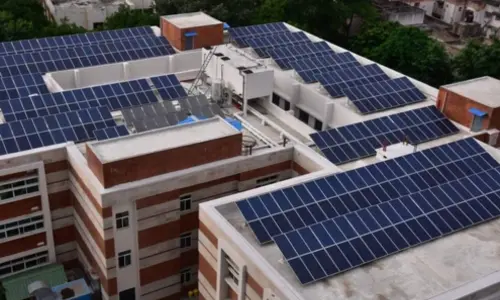
Hotels & Hospitals
Supports life-saving equipment and critical operations.
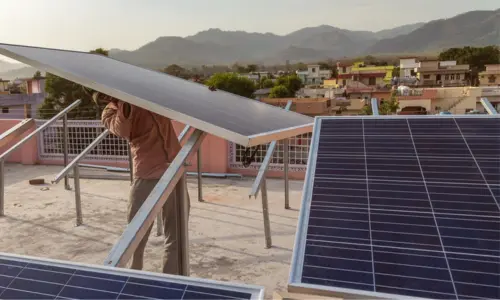
Hotels & Resorts
Reduces dependency on diesel generators while ensuring guest comfort.

Industrial Parks & Multi-Building Complexes
Provides reliable electricity in areas with poor or no grid access.
Challenges of Commercial Off-Grid Solar Systems
High Initial Investment
- Upfront cost of solar panels, batteries, and inverters is significant.
- Financial incentives and loans can improve affordability.
Space Requirements
- Rooftops or open areas needed for panels and battery rooms.
- Innovative layouts like vertical or dual-use rooftops can help.
Maintenance of Batteries
- Batteries require regular monitoring and periodic replacement.
- Industrial-grade batteries and predictive maintenance minimize downtime.
Subsidies for Commercial Off-Grid Solar
- Accelerated Depreciation (AD) – Section 32 Income Tax Act: Up to 40% depreciation in the first year.
- Central Financial Assistance (CFA) – MNRE: Up to 30% subsidy for eligible off-grid solar projects.
- State-Specific Programs: Many states offer capital subsidies, low-interest loans, and incentives for commercial off-grid systems.
- Production Linked Incentive (PLI) Scheme: Supports usage of domestically manufactured high-efficiency solar modules.
Why Choose Us for Commercial Off-Grid Solar Solutions
Proven Expertise
Proven experience in large-scale commercial off-grid installations.
Financial Guidance
Assistance with loans, subsidies, and AD benefits.
Premium Technology
Tier-1 solar panels, industrial inverters, and reliable battery storage.
Sustainability Commitment
Helping commercial facilities achieve energy independence and reduce carbon footprint.
Custom Engineering
Tailored to your business’s load profile and operational needs.
End-to-End Support
From site survey and design to installation, monitoring, and maintenance.
Frequently Asked Questions
What is the lifespan of a commercial off-grid solar system?
Solar panels last 25–30 years; batteries 8–12 years; inverters 10–12 years.
Can businesses operate during power outages?
Yes, battery storage ensures uninterrupted power supply even when the grid is down.
How much space is required for a 500 kW off-grid solar system?
Around 50,000–70,000 sq. ft. of rooftop or 1–2 acres for ground-mounted systems plus space for batteries.
Are loans or subsidies available for commercial off-grid solar projects?
Yes, loans covering 70–90% of costs, Accelerated Depreciation (AD), CFA, and state-specific subsidies are applicable.
What is the ROI for commercial off-grid solar systems?
Typically 4–6 years depending on energy consumption and diesel savings.
